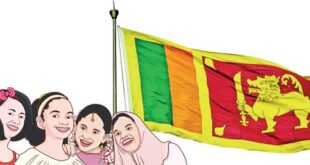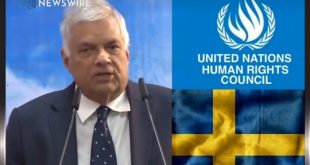President Barack Obama was both a happy man and an angry man this week. He was happy because he managed to get his ambitious healthcare reforms bill passed by the House of Representative by a narrow margin. He was angry because Israeli Prime Minister Benjamin Netanyahu openly defied the US request to stop new settlement building activities in the occupied West Bank.
This column today analyses the news that made him happy and leaves the other matter for another day.
The right to life – qualify life – is an inalienable right of every human being. The World Health Organisation recognizes access to healthcare as a fundamental right. Its constitution says: “the enjoyment of the highest attainable standard of health is one of the fundamental rights of every human being…”
In the United States, the right to healthcare is enshrined in the declaration of Independence. The declaration says, “… all men are created equal, that they are endowed by their Creator with certain unalienable rights, that among these rights are life, liberty and the pursuit of happiness.”
Addressing the House of Representatives on Sunday, House Speaker Nancy Pelosi interpreted the declaration and said the right to life, liberty and the pursuit of happiness meant right to healthcare.
Until the passage of this bill on Sunday, the United States had been the only wealthy developed nation that had not ensured health coverage to all its citizens. But the landmark bill, despite its positives outweighing its negatives, has divided the United States. The opposition was so venomous that it reached murderous proportions. According to ABC News, the US secret service is investigating two Twitter messages which called for the assassination of President Obama. They believe the threats are linked to the healthcare reforms bill.
One message read: “ASSASSINATION! America, we survived the Assassinations and (sic) Lincoln & Kennedy. We’ll surely get over a bullet to Barack Obama’s head.” Another Twitter user wrote: “You Should be Assassinated!! Barack Obama… If I lived in DC. I’d shoot him myself. Dead f***ing serious.”
Why are some Americans so angry that they even want to kill Obama? The opposition to the bill not only came from the rightwing Republican and hardcore capitalist quarters. It came also from Obama’s socialist supporters who felt betrayed when the original bill was watered down.
True, the bill that guarantees health cover to virtually all Americans is not a perfect piece of legislation. Obama, perhaps, believed that some form of a healthcare bill was better than no healthcare bill. So he made compromises to accommodate the concerns of the insurance industry, tax-economists and politicians who represent America’s rich. The rich saw the bill as a socialist document and a move to rob the rich to pay the poor.
For instance, the initial plan had a “public option” which envisaged the implementation of government-run healthcare facilities to all Americans, regardless of income or health conditions. Due to strong opposition, Obama had to omit this poor-friendly measure. It was with such compromises that Obama managed to persuade some Democrats to vote for the bill. But Obama’s moves to placate the rich angered his socialist supporters. Film maker Michael Moore was a campaigner for the bill. Now he has turned a critic. In an interview with CNN’s Larry King Live, he said: “I wanted people to vote for this in Congress. But I’m saying that with many, many reservations. I believe this bill is two steps forward and one giant step backwards … We do not have universal healthcare in this country tonight as a result of this bill. In fact, we do not have any real overhaul of our healthcare system.”
Other socialist critics have slammed the bill as a document that makes rich insurance companies richer. Some went to the extent of charging that Obama had an underhand deal with insurance companies.
Before the House passed the bill, the Senate okayed it in December last year. President Obama on Monday signed the bill, appropriately titled the Patient Protection and Affordable Care Act, giving it the force of law. Some of the provisions of the law will come into effect as early as September this year while the full implementation of the law will take place in 2014.
In terms of the new law, an estimated 32 million uninsured Americans will receive health coverage. This will mean 95 percent of all Americans will have health insurance. The law offers subsidized premiums for the poor and a Medicaid system to help those who cannot afford insurance.
The Act says insurance companies will not be allowed to deny coverage to people with “pre-existing conditions” such as asthma or epileptic fits. Another progressive measure in the Act is that it allows children to remain on their parents’ insurance coverage until they reach the age of 26. Many hail this provision because it will help unemployed college students. The law also insists that insurance companies should spend at least 80 percent of the premiums on actual medial care for their clients while it also sets up federally-regulated insurance exchanges where people can purchase insurance at competitive prices.
Despite these progressive measures, the bill has drawn much criticism from the capitalists.
They oppose the provision which imposes a tax on expensive healthcare plans of the rich. The administration says the tax will help subsidise the insurance coverage of the poor. But the rich ask why they should pay for their neighbours’ insurance policy. They insist that if someone is unable to pay for his insurance, the government should step in instead of taxing the rich.
The Act also imposes a fine on individuals who fail to buy insurance policies. The fine amounts to a 2.5 percent increase in income tax. The fine also extends to companies which will not insure their employees. Some companies say they will rather pay the small fine than go through the bigger financial burden of insuring employees.
Some pro-capitalist economists say that increasing the taxes and financial burdens of the rich will do more harm to the economy, especially at a time when their money is needed to galvanise an economy that is recovering from the global financial crisis.
Insurance companies oppose the bill for another reason. Though they will benefit from the 32 million new insurance policies, they claim it is too risky a business to offer insurance coverage to high-risk patients.
Apart from these pros and cons, the healthcare issue needs to be looked in the context of the bigger picture that includes the United States’ ever-increasing defence budget and the thumping profits made by the pharmaceutical industry. The US defence budget has been rapidly increasing since President George W. Bush assumed office. According to the Stockholm Peace and Research Institute (SIPRI), the US military expenditure has accounted for 42% of the world total for the past ten years.
In one of its reports, SIPRI said, “There is a large gap between what countries are prepared to allocate for military means to provide security and maintain their global and regional power status, on the one hand, and to alleviate poverty and promote economic development, on the other.”
The remark by SIPRI underscores the belief that the more a government increases its expenditure on national security, the more insecure the people it governs are. On the one hand, the money spent by one nation on wars and weapons – the money that sustains the industry of violence – promotes wars and mutual distrust, prompting increased defence spending by rival nations also. On the other, more defence expenditure means the governments has less money to spend on social development areas such as health and education. True, the US is the world’s largest spender on health. Last year, more than $2 trillion or 16 percent of the GDP was spent on healthcare by the United States. But more in terms of social development could be achieved if the defence expenditure which amounted to $857 billion dollars for this year is pruned. If the Bush administration had not invaded Afghanistan and Iraq, the United States could have saved $975 billion and this money could have been used to subsidise the health insurance of the low-income Americans or been channelled towards the rebuilding of earthquake-devastated Haiti.
Another area that requires the attention of the Obama administration is the regulation of the pharmaceutical industry. Pharmaceuticals companies are earning massive profits, making healthcare unaffordable to people not only in the United States, but throughout the world. These companies justify their plunder by saying that the profit is necessary to reinvest in research and development. Governments, especially those in the capitalist west, could do well to remember the unchecked profits made by banks and the huge bonuses paid to bank executives – practices that led to the bankruptcy of several banks and the global financial crisis – if they are serious about ensuring the people’s right to healthcare.
 Sri lanka Muslims Web Portal Diversity and Inclusiveness
Sri lanka Muslims Web Portal Diversity and Inclusiveness




